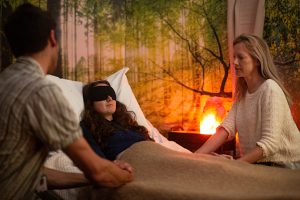Mindfulness Components of Decentering, Acceptance, and Non-Attachment are All Subsumed as a “Delusion of Me”
By John M. de Castro, Ph.D.
“You’re not really selfless- I am!” – Joseph Goldstein
Most people strongly believe that they have a self, an ego. Reflecting this, our language is replete with concepts that contain self; oneself, myself, himself, herself, ourselves, self-concept, self-esteem, self-love, self-regard, selfless, selfish, selfhood, selfie, etc. But particularly note the term self-concept. It directly states that self is a concept. It is not a thing. It is an idea. This is important, as most of us think that there is a thing that is the self, when, in fact, there is not. A concept is a way to summarize a set of phenomena that appear to have common properties, such as fruit, or more abstractly, attention. But note there is not a single entity that is fruit. It is a set of things that are grouped together by common biological factors. The idea of attention is not a thing. Rather it refers to a set of processes. This is also true of the concept of self.
The problem with the idea of a self is that it can lead to not seeing things as they are, a rigidity in approaching the world, and psychological distress. Mindfulness practices are thought to alter or even eliminate the idea of a self. These practices are thought to change different components of the self, producing decentering, acceptance, and non-attachment. But the meanings of these concepts have major overlaps. This suggests that they may be measuring in part a similar component. A statistical method to tease out common factors is called factor analysis. Perhaps it can identify the common component contained in decentering, acceptance, and non-attachment.
In today’s Research News article “Decentering, Acceptance, and Non-Attachment: Challenging the Question “Is It Me?”.” (See summary below or view the full text of the study at: https://www.ncbi.nlm.nih.gov/pmc/articles/PMC8637104/ ) Soler and colleagues recruited adults online who were meditators and meditation naïve participants and had them complete an online survey measuring mindfulness, decentering, non-attachment, resilience, anxiety, depression, and stress. These data were then subjected to an exploratory and confirmatory factor analyses.
They identified a general factor that subsumed the three constructs of decentering, acceptance, and non-attachment. When the shared general factor was present the individual differences between the concepts were minimal. They labelled the general factor as “Delusion of Me”. This refers to seeing that the self is a delusion. Decentering reflects just that, acceptance reflects seeing things as they are, and non-attachment reflects an absence of a fixation on ideas like those generated by a self. So, all three concepts contribute to the dissolution of an idea of self and the advancement of an understanding that the self is but a delusion.
They found that the higher the levels of this general factor, “Delusion of Me,” the higher the levels of resilience. This suggests that the idea of self reduces latitude of actions making one less resilient. This in turn explains why mindfulness training significantly improves resilience. In addition, the higher the levels of “Delusion of Me” the lower the levels of depression. This suggests that the idea that there is a self leads to a rigidity in processing experiences producing expectations of how things should be, and this contributes to feelings of depression. This also explains why mindfulness training significantly reduces depression.
These findings are correlational and as such do not determine causation. It is possible that a lack of resilience and the presence of depression produces a concept of “Me”. But the findings open up a potentially fruitful avenue of research by specifying a specific conceptual variable which may contribute to psychological well-being. This may lead to more focused therapeutic techniques that may better treat mental illness and contribute to human thriving.
So, mindfulness components of decentering, acceptance, and non-attachment are all subsumed as a “Delusion of Me”.
“delusion is a state of not realizing what it is that we actually know, and what we don’t know — and not asking the right questions. It is a state of failure or resistance to see things as they actually are.” – Sharon Salzberg
CMCS – Center for Mindfulness and Contemplative Studies
This and other Contemplative Studies posts are available on Twitter @MindfulResearch
Study Summary
Soler J, Montero-Marin J, Domínguez-Clavé E, González S, Pascual JC, Cebolla A, Demarzo M, Analayo B, García-Campayo J. Decentering, Acceptance, and Non-Attachment: Challenging the Question “Is It Me?”. Front Psychiatry. 2021 Nov 18;12:659835. doi: 10.3389/fpsyt.2021.659835. PMID: 34867498; PMCID: PMC8637104.
Abstract
Among mindfulness measures the three constructs acceptance, decentering, and non-attachment are psychometrically closely related, despite their apparent semantic differences. These three facets present robust psychometric features and can be considered core themes in most “third wave” clinical models. The aim of the present study was to explore the apparently different content domains (acceptance, decentering, and non-attachment) by administering various psychometric scales in a large sample of 608 volunteers. Resilience and depression were also assessed. Exploratory and confirmatory factor analyses performed in two randomly selected subsamples showed a bifactor approximation. The explained common variance suggested a unidimensional nature for the general factor, with good psychometric properties, which we named “Delusion of Me” (DoM). This construct is also strongly correlated with resilience and depression, and appears to be a solid latent general construct closely related to the concept of “ego.” DoM emerges as a potentially transdiagnostic construct with influence on well-being and clinical indexes such as resilience and depression. Further studies should analyze the potential utility of this new construct at a therapeutic level.
https://www.ncbi.nlm.nih.gov/pmc/articles/PMC8637104/









